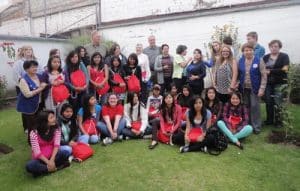Redinger takes trip of a lifetime to Ecuador

Pictured is Redinger’s mission team and the girls and women of the Chuquiragua Kiwanis Club. Redinger is pictured front row, fourth from left. (submitted photo)
The moment Hannah Redinger of Columbia stepped off the plane into Quito, Ecuador, her life was changed forever.
Having raised more than $2,000 and having received 1,000 school supply donations, Redinger, 18, looked forward to presenting supplies to 20 Ecuadorian high school girls who couldn’t afford the items themselves.
“We went to meet with the (girls) on the third day to present the items,” she told the Republic-Times. “They were really happy and gracious, and I started crying, and they told me not to cry, but that didn’t help.”
Redinger met with 18 of the 20 girls of the Chuquiragua Kiwanis Club on July 2. Later on, they reached out to her on Facebook to thank her and tell her they love her.
“They have the same interests as other high school girls,” she said. “I know one of them wants to go into accounting. Some said they might take a year off of school before going to college.”
Redinger’s mother Sharon saw the project as an opportunity to do what most people never can.
“We were happy for her that she would get to see her project to completion by bringing those supplies to the girls,” she said.
The trip Redinger returned from last week included 11 other missionaries, organized through the Illinois South Conference United Church of Christ. These other service members came from different parts of southern Illinois, such as Belleville and Carbondale. More information is available at iscucc.org.
Rather than worry about their daughter flying to another country, Redinger’s parents made peace with how well the trip went and were also deeply inspired by the work she does.
“It’s so exciting to see what she’s been able to do,” Sharon said. “The way she advocates for girls is incredible.”
After meeting with the girls, the group went on to assist in a Habitat for Humanity project, working on the foundation for a house the rest of the week. That constitutes one of Redinger’s most memorable parts of the trip.
“We ate dinner with the family that we were building the house for, and the 6-year-old daughter wanted to play with me the whole time and push her on the swings. She wanted me to stay and keep pushing her. When we were saying goodbye, she said, ‘Saca un foto más,’ which means she wanted to take one more picture with me.”
Most of the trip consisted of service, but Redinger did take in some of the cultural experience as well. She developed a taste for fried pork with rice and cooked veggies with dressing.
Additionally, she hiked up the volcano Chimborazo in the Cordillera Occidental range of the Andes, where the elevation was about the same as Denver.
“You’re fine as long as you stay hydrated,” she said of the altitude.
Part of what helped Redinger serve and enjoy the country was the way the native people helped acclimate her to the area.
“The people in Ecuador would help you with your Spanish,” she said. “As long as you made an effort, they would slow down for you.”
However, one part of the culture that required patience is how casual Ecuadorians are about time.
Redinger said they needed to plan accordingly because of the difference.
“It is different than what you’re used to because they move at a chill pace. If we wanted to have breakfast at 8 a.m., we would get it at about 8:30 or 9 a.m. So we would have to tell them like a half hour early to get ready on time.”
In the end, Redinger enjoyed the week-and-a-half-long trip that would impact her for a lifetime. She hopes one day to return to the country.
For now, she will finish out the rest of her summer at home, then begin college at Kansas State University in Manhattan, Kan., where she declared as her major animal science with a pre-veterinary concentration. Redinger hopes to use her major as an opportunity to study abroad and return to Ecuador.
“There were a lot of strays because people don’t take care of their pets, or if they do, it’s not like here,” she said.
Redinger began to dream of taking the original trip six years ago after seeing how well the experience turned out for the youth group in her church. Eventually that dream would blossom, and there would be no stopping her.
Even an earthquake in April that killed more than 272 people in coastal Ecuador didn’t change her mind.
“It was amazing,” she said. “I would tell people to do it because it’s a different cultural experience.”






